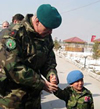Number 83 | December 8, 2009
Excerpted from article by Joshua W. Walker, Transatlantic Academy in the German Marshall Fund and Truman National Security Fellow, published on www.wonkroom.thinkprogress.org and The Hill’s Congress Blog, December 7, 2009.
President Obama laid out his new Afghanistan strategy on Tuesday night, announcing an additional 30,000 US troops for the country in support of a new counter-insurgency strategy. While the majority of the analysis and discussion in Washington has centered on the levels of US forces or the President’s reasoning for it, the President emphasized that the “burden is not ours alone to bear.”
Declaring that not only is NATO’s credibility on the line, but that the security of the US and all of its allies are at stake, the President invoked the international consensus on Afghanistan that led to a 43 nation coalition that has operated in there since the attacks on September 11, 2001. Yet the reality is that this international coalition is waning, not surging, and is in desperate need of a regional champion that can serve as a model partner for the US in Afghanistan. Obama’s ideal partner is Turkey.
Consider the facts: Turkey boasts the second largest military in NATO after only the US and the largest in Europe. Turkey has been a close American bilateral and NATO ally for over sixty years. In addition to being a member of almost every European organization, Turkey chairs the Organization of Islamic Conference States, is a UN Security Council member, is a member of the G-20, and is one of the few examples of a functioning Muslim-majority democracy in the Middle East.
On top of all of this, Ankara has close historic ties to Afghanistan that date back to the 1920s when the founder of the modern Turkish Republic, Mustafa Kemal Ataturk, served as a model for modernization that collapsed only after great power interference in Kabul carved up the country. Often referred to as Afghanistan’s “closest neighbor without borders,” Turkey also shares considerable cultural, ethnic, and linguistic links that make it an ideal partner for the US.
The Turks have taken command for the second time of the International Security Assistance Forces (ISAF) in Kabul and doubled their troop levels to 1,600 troops in the last few months. Every place the Turks, both civilian and military alike, have controlled have resulted in considerable and consistent improvements in ways that few other Western allies can claim. Having once contributed the third highest number of troops in Afghanistan, the Turks today with their 2.5 million soldiers are an under-utilized and under-appreciated ally that Washington would be wise to actively court and engage.
Turkey is eager to prove its importance as a rising regional power. As demonstrated in recent months by Ankara’s moves in Armenia, Syria, and Iraq, Turkey has transformed itself from a static Cold-War bulwark into a potential catalyst for regional stability. At the same time Ankara’s rhetoric and moves towards Iran, Israel, and Sudan have confused many in Washington. As a result, Turkey’s new self-confidence and regional prominence would be best channeled towards Afghanistan in a way that highlights Turkey’s vital transatlantic connection and newly emerging leadership role in the Muslim world.
In this respect Turkey is both internationally and domestically well-positioned to play a larger role in Afghanistan (…) Turkish diplomats, politicians, workers, and military personnel can travel with a lighter footprint in Afghanistan than their Western counterparts. So working with Turkey makes pragmatic and strategic sense. By playing to the Turks’ newly discovered self-confidence in Afghanistan, the President can transfer critical responsibility to an ideal partner that is poised to play an increasingly important regional role. Not only will enhanced US-Turkish cooperation serve the interests of Afghanistan, it is also a win-win for America and Turkey.

























